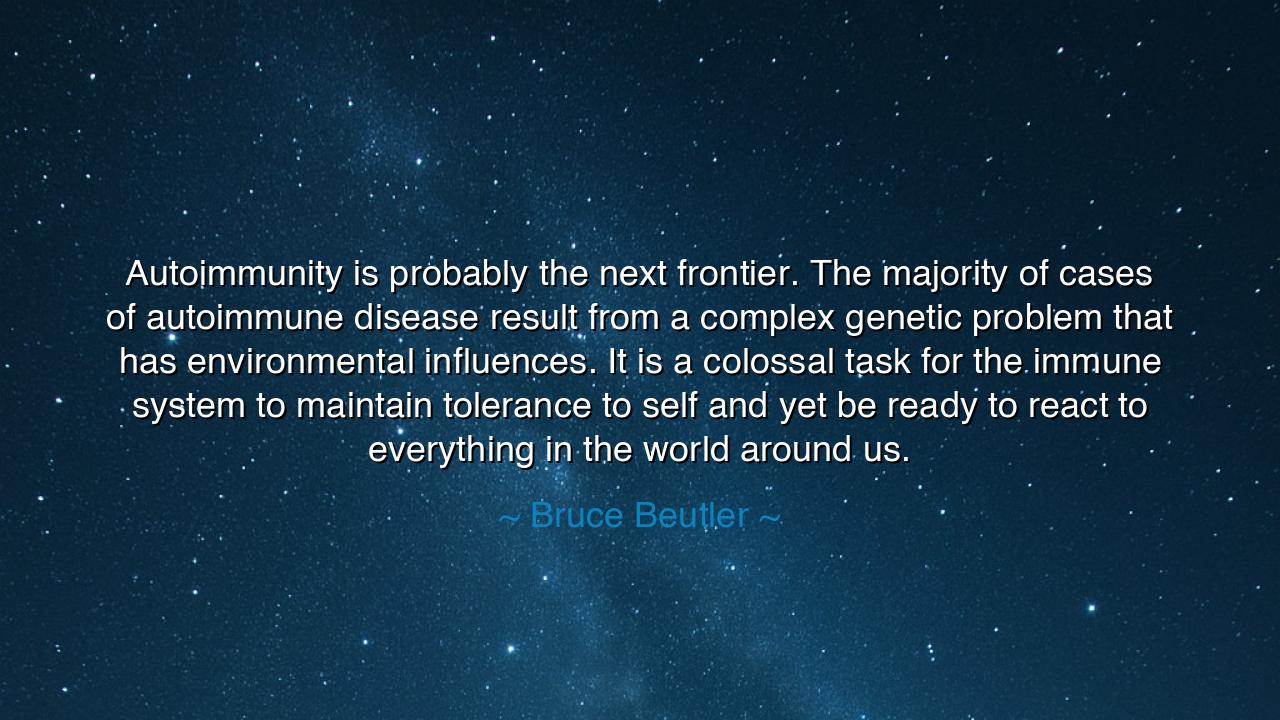
Autoimmunity is probably the next frontier. The majority of cases
Autoimmunity is probably the next frontier. The majority of cases of autoimmune disease result from a complex genetic problem that has environmental influences. It is a colossal task for the immune system to maintain tolerance to self and yet be ready to react to everything in the world around us.






In the chronicles of human understanding, the study of life’s defenses—the immune system—has always stood as one of the most wondrous frontiers. Bruce Beutler, a Nobel laureate and pioneer in immunology, declared: “Autoimmunity is probably the next frontier. The majority of cases of autoimmune disease result from a complex genetic problem that has environmental influences. It is a colossal task for the immune system to maintain tolerance to self and yet be ready to react to everything in the world around us.” In these words lies both the marvel and the tragedy of being alive: the paradox that within the same body that sustains life, there exists the potential for self-destruction.
The ancients, though unaware of genes or antibodies, sensed this delicate balance. In their philosophies and myths, they spoke of the body as a kingdom and the soul as its guardian. Harmony between inner forces was vital—when the kingdom turned against itself, illness was born. What Beutler describes in scientific terms, they described in spiritual ones: the eternal struggle to distinguish friend from foe, to defend against chaos without destroying the self. The immune system, in its wisdom and fragility, is a living mirror of this ancient truth.
Throughout history, humanity has waged countless wars against disease, but autoimmunity represents a deeper and subtler battle—the war within. It is not an invasion from without, but a rebellion from within one’s own defenses. The same soldiers that protect the body mistake its tissues for enemies, unleashing destruction in the name of survival. Diseases such as lupus, multiple sclerosis, and type 1 diabetes are born of this tragic confusion. Beutler’s insight reveals that to heal these conditions, we must understand not only the genetic architecture of life, but also the invisible influences of the environment—the food we eat, the air we breathe, the stresses we endure, and the chemicals that weave through our modern existence.
Consider the example of Dr. Frederick Banting, co-discoverer of insulin. His discovery transformed diabetes from a death sentence into a manageable condition. Yet, nearly a century later, scientists realized that in type 1 diabetes, the body’s immune cells destroy the pancreas itself—the very organ meant to sustain life. This is the tragedy and complexity Beutler speaks of: the immune system, designed as the shield of life, can become its own undoing. The frontier, then, is not only scientific—it is moral and philosophical. It forces humanity to look inward, to ask how much imbalance—genetic or environmental—we have invited through the very progress we celebrate.
Beutler’s words also illuminate the immense intelligence of the immune system. To “maintain tolerance to self and yet react to everything in the world around us” is an act of perpetual vigilance, one that no machine or algorithm could equal. It is the eternal dance between recognition and restraint, defense and peace. The ancients might have called it the wisdom of the body—a silent awareness that distinguishes self from other. When this awareness falters, chaos follows. In that chaos lies the mystery that modern science strives to decipher.
From this reflection arises a profound lesson for all who seek understanding: that balance, in body as in life, is the root of harmony. Just as the immune system must know when to fight and when to stand still, so must human beings learn restraint amidst conflict, compassion amidst fear, and awareness amidst ignorance. The environmental influences that Beutler mentions are not limited to pollution or toxins—they are also the collective energies we generate as societies: stress, neglect, greed, and disregard for nature. To heal the body, we must also heal the world that shapes it.
Practically, Beutler’s insight calls for a union of disciplines: scientists must study genes not in isolation but in the context of ecology and lifestyle; individuals must take stewardship of their own health by nurturing both mind and body. Eat from the earth, move with purpose, rest deeply, and seek harmony with the natural world. In doing so, we honor the immune system’s sacred task—to defend without destruction, to protect without harm.
Thus, Bruce Beutler’s reflection stands as both a warning and a revelation: autoimmunity is not merely a medical challenge—it is a metaphor for humanity’s greater struggle. Just as the body must learn to live without attacking itself, so too must civilization learn to thrive without wounding the planet that sustains it. The frontier he speaks of is not only scientific, but spiritual. To master it, we must cultivate wisdom equal to the complexity of life itself—a wisdom that unites knowledge, compassion, and reverence for the miraculous balance within and around us.






AAdministratorAdministrator
Welcome, honored guests. Please leave a comment, we will respond soon